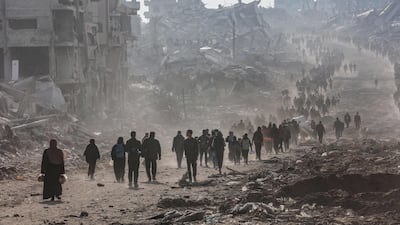Live updates: Follow the latest on Israel-Gaza
Gaza's destroyed streets echoed with cries of victory as thousands of displaced residents from the northern enclave and Rafah started their journeys back to their war-ravaged homes, seeking to reclaim a semblance of normality, despite Israel delaying the long-awaited ceasefire on Sunday.
The truce, which had been set to start at 8.30am local time, went into effect three hours later, when Israel received a list of hostages from Hamas. The organisation had earlier reaffirmed its commitment to the agreement, explaining the delay in providing the names were due to "technical field reasons". Israeli media later reported that the Palestinian group sent the names of the three captives set to be freed.
Since Mr Netanyahu's announcement, Israeli forces have attacked sites in Rafah and eastern Gaza, killing at least 10 Palestinians and injuring 25, civil defence spokesman Mahmoud Basal said. Meanwhile, police officers in Gaza began moving out across the city following the start of an Israeli withdrawal from Rafah, indicating that the beginning of the truce was imminent.
Some residents of Jabalia camp in northern Gaza – which has been subjected to an Israeli siege since October – were not prepared to wait any longer and began moving back their homes in the early hours of Sunday.
Ragheb Masoud, 41, was among those desperate to return. "As the morning broke, impatience grew and people advanced into the camp and surrounding areas," he told The National.
"The destruction was beyond words – streets filled with rubble, bodies scattered and nothing left standing."
When he reached his home in Al Faluja, Mr Masoud was devastated. "My home was a sanctuary for my family of seven and my brother’s family of six. Now, all of us are left with nothing but the street. The Israeli army obliterated everything – there’s no life left in northern Gaza," he said.
Witnesses say the streets of Jabalia are piled with rubble and destruction, with the smell of decomposing bodies overpowering as many of the dead are trapped under the debris. Others lie decaying in the streets.
The ceasefire offers a fragile hope for Gaza’s people but the road to recovery is steep, littered with the remnants of unimaginable destruction.
Fawzi Abu Rukbah, 44, was displaced from Jabalia to Gaza city after the army stormed their shelter in November. Mr Abu Rukbah had anxiously awaited the day the ceasefire came into effect, so he could go to check on his home. "My house, built through years of hard work, was gone – demolished and reduced to nothing. Over 12 years of memories erased in an instant," he told The National.
He described the sights he was met with on his journey home. "The streets were filled with rubble and ruins. Northern Gaza is unrecognisable – everything destroyed, everyone devastated. It’s incredibly painful and I can’t comprehend what happened. I honestly don’t know how to continue living after this or how to rebuild my life. The devastation is beyond anything the human mind can imagine.
"The rubble and destruction are everywhere, there are no homes left in the north," he added. "This is the reality for all of us."
Despite the loss, Mr Abu Rukbah found some comfort in shared suffering. "What brings some solace is knowing that this tragedy affects everyone. This is a collective tragedy. No one has been spared. Praise be to God in all circumstances."


